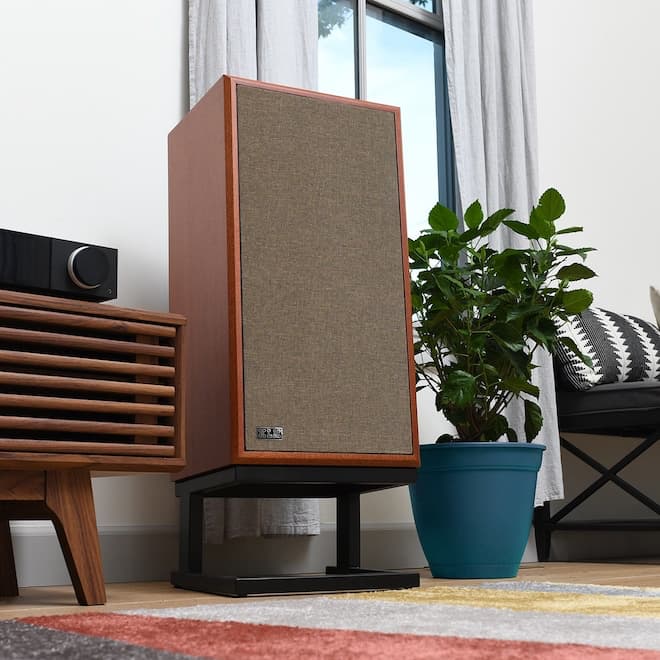The Best Vintage Audio Speakers for the Modern Audiophile
The interest in vintage audio speakers has never been higher; especially as brands continue to refresh popular models that have been around for years.
By Ian White
Published May 4, 2022
Consumers and manufacturers love to wax poetically about “vintage” when it comes to loudspeakers and amplifiers but I’m not sure I buy into it as much when it comes to most vintage loudspeakers. Vintage speakers require a lot of work and some luck if the previous owners have been less than gentle with them.
A clumsy mover destroyed a pair of vintage Celestion Ditton 33 MKIIs that I had taken care of for over 13 years without a scratch. Getting the drivers replaced wasn’t very easy and the cabinets were a loss.
Nostalgia is one powerful drug. The vinyl revolution was certainly inspired by a heavy dosage of it but that isn’t enough to sustain a movement. What has given vinyl’s unexpected comeback some solid legs is that millennials have discovered the benefits of ownership; the generation that grew up on iTunes and Spotify finally have a physical piece of media that they can own – just like their parents and older siblings.
Loudspeaker manufacturers have taken that newfound interest in nostalgia and reintroduced updated versions of their most popular vintage audio speakers with a great deal of success so far.
Products like the Wharfedale Linton Heritage and Klipsch Forte IV loudspeakers are all the proof one requires.
All of the loudspeakers on our list have sold well; the Linton Heritage has been an enormous success for Wharfedale and for good reason.
Supply chain issues and inflation have also made all of them more expensive. Our prices below have been updated to reflect an increase of over 10% or more for all of them so far in 2022.
The Linton Heritage have jumped from $1,499 to $1,799 USD which is not an insignificant amount of money if you are working with a tight budget.
The JBL have increased by $400 and the Klipsch are now $5,000 USD which is a $500 increase from January.


KLH Audio is back in the game now with the brand new KLH Model Five that has earned rave reviews from both the press and consumers. Eric Pye has his rather in-depth review forthcoming at the end of May and he’s put a lot of hours through his pair.
The company started by Henry Kloss, Malcom Low, and Josef Anton Hofmann in 1957 sold over 30,000 pairs of loudspeakers before it was sold off in 1964; the brand had numerous owners including Kyocera who stopped manufacturing audio components in 1989.
KLH Audio is a new company owned by Klipsch and VOXX executive, David P. Kelley. The vintage audio vibe is very strong with the Model 5 and the backlog of orders is considerable.
Vintage audio has never been more popular; our two weekly columns deliver consistent traffic and comments that match the response to our most popular reviews of new products.
The interest in vintage audio loudspeakers has never been higher; especially as brands continue to refresh popular models that have been around longer than most millennials who are getting into better sound quality for the first time.
Quality matters. Especially when there is a premium attached to ownership.
Consumers are willing to spend a lot of money; often more than the price of a new high-end system, for really rare vintage audio components from brands like McIntosh, Mark Levinson, Krell, and Quad – so it should not surprise anyone that people are very interested in new loudspeakers from some of the oldest high-end brands that pay homage to classic designs that once occupied the front covers of every Hi-Fi magazine.
JBL, Klipsch, and Wharfedale have been manufacturing award-winning loudspeakers for almost 73 years; all three companies entered the loudspeaker business in 1946 run by three visionaries who had spent the previous decades working on loudspeaker drivers for other audio components such as radio consoles and movie theater loudspeaker systems. It is a remarkable bit of history that all three brands not only still exist but are category leaders and some of the most popular in the world.
All three have survived generational changes in listening habits, format wars, advancements in amplification technology, the home theater revolution, and the shift to active and wireless loudspeakers.
All of our selections have an old-school aesthetic but sound nothing like their predecessors; these are modern sounding loudspeakers with advanced driver technology and certainly require quality amplifiers and sources. Green shag carpeting is optional.